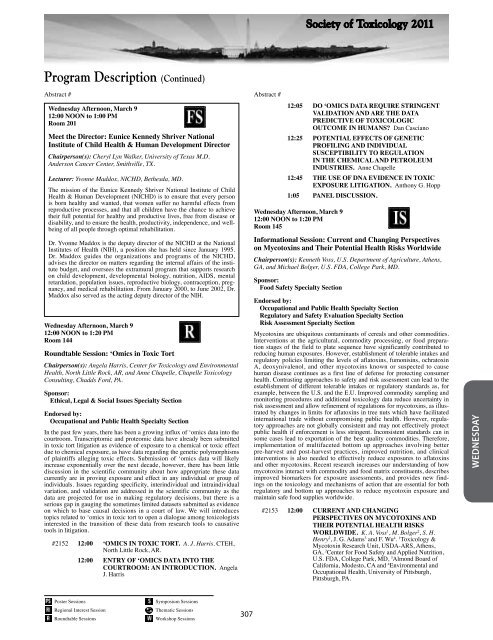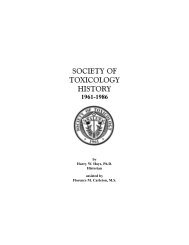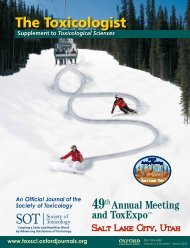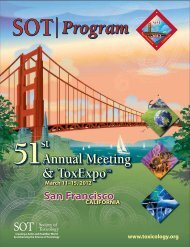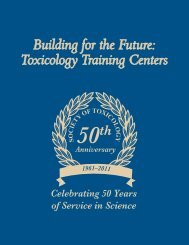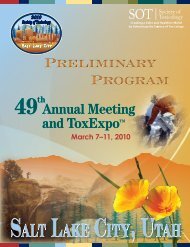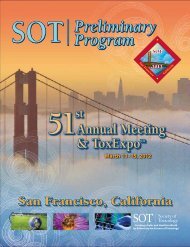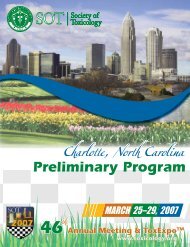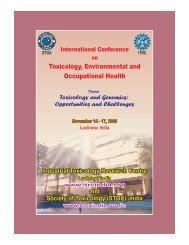Program - Society of Toxicology
Program - Society of Toxicology
Program - Society of Toxicology
You also want an ePaper? Increase the reach of your titles
YUMPU automatically turns print PDFs into web optimized ePapers that Google loves.
<strong>Society</strong> <strong>of</strong> <strong>Toxicology</strong> 2011<br />
<strong>Program</strong> Description (Continued)<br />
Abstract #<br />
Wednesday Afternoon, March 9<br />
12:00 NOON to 1:00 PM<br />
Room 201<br />
Meet the Director: Eunice Kennedy Shriver National<br />
Institute <strong>of</strong> Child Health & Human Development Director<br />
Chairperson(s): Cheryl Lyn Walker, University <strong>of</strong> Texas M.D.<br />
Anderson Cancer Center, Smithville, TX.<br />
Lecturer: Yvonne Maddox, NICHD, Bethesda, MD.<br />
The mission <strong>of</strong> the Eunice Kennedy Shriver National Institute <strong>of</strong> Child<br />
Health & Human Development (NICHD) is to ensure that every person<br />
is born healthy and wanted, that women suffer no harmful effects from<br />
reproductive processes, and that all children have the chance to achieve<br />
their full potential for healthy and productive lives, free from disease or<br />
disability, and to ensure the health, productivity, independence, and wellbeing<br />
<strong>of</strong> all people through optimal rehabilitation.<br />
Dr. Yvonne Maddox is the deputy director <strong>of</strong> the NICHD at the National<br />
Institutes <strong>of</strong> Health (NIH), a position she has held since January 1995.<br />
Dr. Maddox guides the organizations and programs <strong>of</strong> the NICHD,<br />
advises the director on matters regarding the internal affairs <strong>of</strong> the institute<br />
budget, and oversees the extramural program that supports research<br />
on child development, developmental biology, nutrition, AIDS, mental<br />
retardation, population issues, reproductive biology, contraception, pregnancy,<br />
and medical rehabilitation. From January 2000, to June 2002, Dr.<br />
Maddox also served as the acting deputy director <strong>of</strong> the NIH.<br />
Wednesday Afternoon, March 9<br />
12:00 NOON to 1:20 PM<br />
Room 144<br />
Roundtable Session: ‘Omics in Toxic Tort<br />
Chairperson(s): Angela Harris, Center for <strong>Toxicology</strong> and Environmental<br />
Health, North Little Rock, AR, and Anne Chapelle, Chapelle <strong>Toxicology</strong><br />
Consulting, Chadds Ford, PA.<br />
Sponsor:<br />
Ethical, Legal & Social Issues Specialty Section<br />
Endorsed by:<br />
Occupational and Public Health Specialty Section<br />
In the past few years, there has been a growing influx <strong>of</strong> ‘omics data into the<br />
courtroom. Transcriptomic and proteomic data have already been submitted<br />
in toxic tort litigation as evidence <strong>of</strong> exposure to a chemical or toxic effect<br />
due to chemical exposure, as have data regarding the genetic polymorphisms<br />
<strong>of</strong> plaintiffs alleging toxic effects. Submission <strong>of</strong> ‘omics data will likely<br />
increase exponentially over the next decade, however, there has been little<br />
discussion in the scientific community about how appropriate these data<br />
currently are in proving exposure and effect in any individual or group <strong>of</strong><br />
individuals. Issues regarding specificity, interindividual and intraindividual<br />
variation, and validation are addressed in the scientific community as the<br />
data are projected for use in making regulatory decisions, but there is a<br />
serious gap in gauging the sometimes limited datasets submitted as evidence<br />
on which to base causal decisions in a court <strong>of</strong> law. We will introduces<br />
topics related to ‘omics in toxic tort to open a dialogue among toxicologists<br />
interested in the transition <strong>of</strong> these data from research tools to causative<br />
tools in litigation.<br />
#2152 12:00 ‘OMICS IN TOXIC TORT. A. J. Harris. CTEH,<br />
North Little Rock, AR.<br />
12:00 ENTRY OF ‘OMICS DATA INTO THE<br />
COURTROOM: AN INTRODUCTION. Angela<br />
J. Harris<br />
Abstract #<br />
12:05 DO ‘OMICS DATA REQUIRE STRINGENT<br />
VALIDATION AND ARE THE DATA<br />
PREDICTIVE OF TOXICOLOGIC<br />
OUTCOME IN HUMANS? Dan Casciano<br />
12:25 POTENTIAL EFFECTS OF GENETIC<br />
PROFILING AND INDIVIDUAL<br />
SUSCEPTIBILITY TO REGULATION<br />
IN THE CHEMICAL AND PETROLEUM<br />
INDUSTRIES. Anne Chapelle<br />
12:45 THE USE OF DNA EVIDENCE IN TOXIC<br />
EXPOSURE LITIGATION. Anthony G. Hopp<br />
1:05 PANEL DISCUSSION.<br />
Wednesday Afternoon, March 9<br />
12:00 NOON to 1:20 PM<br />
Room 145<br />
Informational Session: Current and Changing Perspectives<br />
on Mycotoxins and Their Potential Health Risks Worldwide<br />
Chairperson(s): Kenneth Voss, U.S. Department <strong>of</strong> Agriculture, Athens,<br />
GA, and Michael Bolger, U.S. FDA, College Park, MD.<br />
Sponsor:<br />
Food Safety Specialty Section<br />
Endorsed by:<br />
Occupational and Public Health Specialty Section<br />
Regulatory and Safety Evaluation Specialty Section<br />
Risk Assessment Specialty Section<br />
Mycotoxins are ubiquitous contaminants <strong>of</strong> cereals and other commodities.<br />
Interventions at the agricultural, commodity processing, or food preparation<br />
stages <strong>of</strong> the field to plate sequence have significantly contributed to<br />
reducing human exposures. However, establishment <strong>of</strong> tolerable intakes and<br />
regulatory policies limiting the levels <strong>of</strong> aflatoxins, fumonisins, ochratoxin<br />
A, deoxynivalenol, and other mycotoxins known or suspected to cause<br />
human disease continues as a first line <strong>of</strong> defense for protecting consumer<br />
health. Contrasting approaches to safety and risk assessment can lead to the<br />
establishment <strong>of</strong> different tolerable intakes or regulatory standards as, for<br />
example, between the U.S. and the E.U. Improved commodity sampling and<br />
monitoring procedures and additional toxicology data reduce uncertainty in<br />
risk assessment and allow refinement <strong>of</strong> regulations for mycotoxins, as illustrated<br />
by changes in limits for aflatoxins in tree nuts which have facilitated<br />
international trade without compromising public health. However, regulatory<br />
approaches are not globally consistent and may not effectively protect<br />
public health if enforcement is less stringent. Inconsistent standards can in<br />
some cases lead to exportation <strong>of</strong> the best quality commodities. Therefore,<br />
implementation <strong>of</strong> multifaceted bottom up approaches involving better<br />
pre-harvest and post-harvest practices, improved nutrition, and clinical<br />
interventions is also needed to effectively reduce exposures to aflatoxins<br />
and other mycotoxins. Recent research increases our understanding <strong>of</strong> how<br />
mycotoxins interact with commodity and food matrix constituents, describes<br />
improved biomarkers for exposure assessments, and provides new findings<br />
on the toxicology and mechanisms <strong>of</strong> action that are essential for both<br />
regulatory and bottom up approaches to reduce mycotoxin exposure and<br />
maintain safe food supplies worldwide.<br />
#2153 12:00 CURRENT AND CHANGING<br />
PERSPECTIVES ON MYCOTOXINS AND<br />
THEIR POTENTIAL HEALTH RISKS<br />
WORLDWIDE. K. A. Voss 1 , M. Bolger 2 , S. H.<br />
Henry 2 , J. G. Adams 3 and F. Wu 4 . 1 <strong>Toxicology</strong> &<br />
Mycotoxin Research Unit, USDA-ARS, Athens,<br />
GA, 2 Center for Food Safety and Applied Nutrition,<br />
U.S. FDA, College Park, MD, 3 Almond Board <strong>of</strong><br />
California, Modesto, CA and 4 Environmental and<br />
Occupational Health, University <strong>of</strong> Pittsburgh,<br />
Pittsburgh, PA.<br />
Wednesday<br />
Poster Sessions<br />
Regional Interest Session<br />
Roundtable Sessions<br />
Symposium Sessions<br />
Thematic Sessions<br />
Workshop Sessions<br />
307


